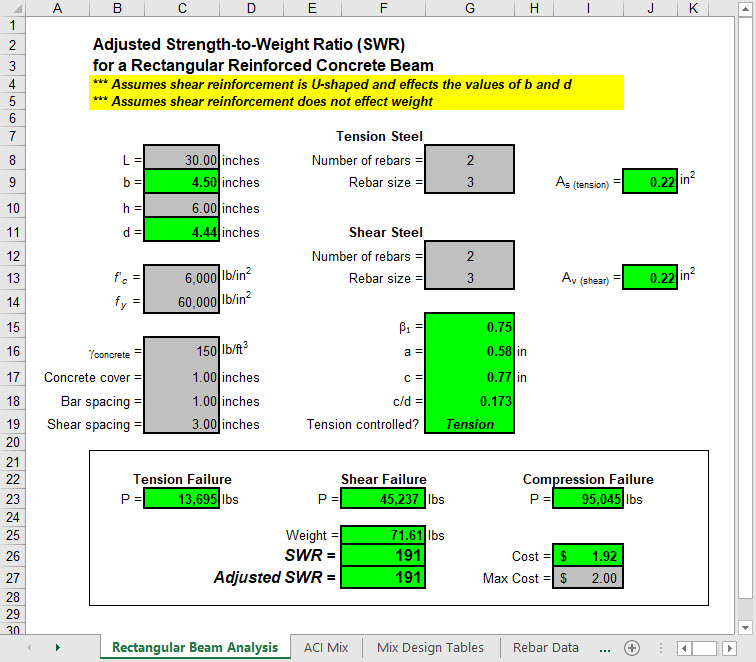|
"If we knew what it was we were doing, it would not be called research, would
it?" - Albert Einstein (1879 - 1955)
Objective
The purpose of this assignment is twofold: first, to continue to develop your
engineering spreadsheet skills; and second, to develop a complete analysis tool
for your reinforced concrete beam project. Basically, this spreadsheet will
combine your work from the ACI mix design (Assignment
#6) and rectangular reinforced concrete beam (Assignment
#7) with an estimate of the reinforced beam cost to predict a cost-adjusted
strength-to-weight ratio (ASWR).
Part 1: Compute the ASWR for each beam from the
Week 1 data. Average the results for each beam type (the set of beams with
no reinforcement, 1 rebar, 2 rebar and 3 rebars) and plot the average ASWR as a function of the number of reinforcing bars.
Part 2: Develop a spreadsheet to predict the ASWR of a
rectangular reinforced concrete beams in bending
without considering shear reinforcement in the beam weight or beam cost. Use
the spreadsheet to predict the ASWR for the reinforced concrete beam displayed in the sample interface sheets shown
below.
-
Input parameters should include: the height and length of the
beam, the amount of reinforcement material (both tension and shear), the compressive strength of the
concrete, the yield stress of the reinforcement, the unit weight of the
concrete, the minimum concrete cover for the reinforcement, the minimum
spacing between rebars, and the shear reinforcement spacing.
-
From these inputs, you should compute the minimum width of the beam
b,
the depth to the center of the reinforcement d, the area of steel
in tension As, the area of steel is shear Av, the b1
constant, The height of the Whitney stress block a, and depth to the neutral
axis c, the c/d, the predicted strength in tension,
shear, and compress, the weight of the beam, the
SWR, the cost of a single beam, and the Adjusted SWR.
-
In addition, check to see if the reinforcement yields before
the concrete crushes (see
class
notes) and that the reinforcing bars fit into the proposed beam.
-
Develop an interface for your spread sheet similar to the
shown below. Note the addition of the cost per beam and the ASWR.

- Compute the cost of the reinforced concrete beam on the
"ACI Mix" sheet of your workbook. Use the format shown below. Note
the costs of concrete materials and steel rebars is included (see
cost
sheet for details). Also notice
that this sheet includes the new values for the material parameters. Values
for the concrete compressive strength, the dimensions of the beam, and the
volume of steel are available from the "Rectangular Beam Analysis"
sheet.

Use your spreadsheet to predict the ASWR for the following reinforced concrete
beam:
Concrete mix criteria: f'c = 6,000 psi, 3 to 4 inches
of slump; 0.375 inch maximum aggregate size; use the values for coarse and fine
aggregate material parameters given in the "ACI Mix" sheet shown above; and
assume that the unit weight of concrete is 150 lb/ft3.
Beam criteria: L = 30 in., h = 6 in., fy
= 60,000 psi, As = two #3 bars in tension, concrete cover
= 1.0 in., bar spacing of 1 in., and one #3 U-shaped rebar spaced at 3 in. for shear reinforcement.
Requirements
Lastly, a web page describing the CIVL 1112
homework
policy is available. Read it before you turn in this assignment. You will be graded
throughout the semester according to the policy outlined in it.
Coversheet for homework
This website was originally
developed by
Charles Camp for
CIVL
1112.
This site is maintained by the
Department of Civil Engineering
at the University of Memphis.
Your comments and questions are welcomed.
|



